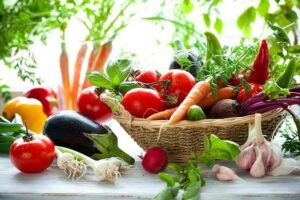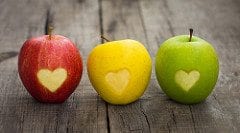The holidays are a joyous time for coming together with family, expressing love and gratitude, and enjoying delicious, homemade meals. In the midst of these festive, social gatherings, mindful eating is sometimes forgotten. Just the thought of the dining table laden with savory, aromatic dishes and oh-so-sweet delicacies can tempt us to overindulge. Thankfully, Swami Satchidananda’s wise advice on how to eat can help us to make sattvic choices this holiday season and beyond.
How to Eat
Know when you eat that all food is God’s body. Your eating should be a sacrifice. When you eat, you should think, “I am eating to gather energy to better serve others.” Whatever you eat, offer it to God and see God in it.
Do not accept food from just anybody. Take or eat only from known hands. Never eat when you are tired, in a hurry, or angry. For mental peace, continually sacrifice or give of yourself. For physical peace, have the right food at the right time in the right quantities and with right thinking while you eat. If you think angry or unhappy thoughts when you eat, the food will be poison. Think about why you are eating. If you like, you can even be mentally chewing a mantra while you chew the food.

Eat the most natural foods when possible.
Always look for the most natural foods. If possible, raise your own vegetables organically. Natural food is the best food. We don’t always have to pay to eat. Like a baby nursing milk from the mother, we too can nurse from Mother Nature, taking from the ground the potatoes and all the natural food we have planted and harvested ourselves. Too often we pay not only for the food we buy, but for the efforts of others who bring food to the door of the store. Then we run to some club to exercise for better digestion and to lose the extra weight.
If, instead, we ourselves put in the effort to plant and grow the food, we will have plenty of exercise to go with the food itself. Then we don’t need health clubs. How many people won’t even pick up a broom and clean their own houses? Yet they pay a lot of money for memberships to work off the calories at the club.
False Hunger
If you eat well and digest well, you won’t have that false hunger which now and then arises between meals. If hunger is real, you don’t have to curb your appetite. But sometimes the appetite is false. Watch out for habitual hunger. Don’t just eat because something is delicious or because it’s twelve o’clock. Eat when you are really hungry. Even then, don’t simply eat anything and everything. Learn to eat the right foods—clean, plain food that’s not mixed with too many other foods, too spicy, or filled with stimulants. You are eating for your mind and for your body, not for your tongue. The food should be plain, tasty, and easily digestible.
Before you respond to hunger, ask yourself carefully, “Who wants to eat now, the tongue or the tummy?” Then wait. If your stomach is really hungry you cannot just put the appetite aside. But if it’s temporary or habitual hunger, and you engage yourself in doing something, the hunger will go away. Then when you finally do eat, eat well. Don’t try to cut back then. Eat until you are satisfied.
Making Healthy Choices
Everything you take into your body should nourish you. Don’t let the food be too spicy because that will disturb the mind and even affect dreams later. Some liquids—water, milk, fruit juices—don’t disturb the body. But strong black coffee or tea kindles up the system because of the caffeine going into the bloodstream. Alcohol is even worse. Anything that is fermented becomes alcohol. That fermentation is an acid. Alcohol is used very well to preserve dead bodies, but it’s not for the living. Be careful what you put into your body.
Even healthy food taken in the wrong amounts won’t digest and will ferment inside you. Imagine the stomach as a big oven that houses your digestive fires. You should eat according to the hunger or the gastric fire in the stomach. If you do, you will never have any problems with food. If, for example, you eat too many foods from roots, which are starchy foods, the fire inside goes down quickly. In other words, it takes longer to digest. Fruits and vegetables, on the other hand, digest more easily.
Still, it’s difficult to categorize everything. Each firehouse is different. Not all people have the same amount of hunger or the same amount of digestive fire. Just because a label may say, “This is good, and contains so much protein, so take it,” don’t immediately buy it. You may not be able to digest that amount of protein.
Prescribe the correct diet for your stomach, not for your height or weight. You decide what is best. Watch the reactions of your stomach to each food and see how each agrees with you. If by chance it doesn’t agree, stay away from it, or lessen the amount. Become your own dietician. Books can give you general guidance, but ultimately you are the best doctor for yourself.
Digestion
You can overhaul your own system. Nothing will create mucous in your system if it is well digested. Otherwise, even the so-called mucous-free diet will still leave mucous to clog you up. Anything left undigested in the stomach begins to ferment. The stomach is like an airtight chamber. If you put the fruit of the vine in an airtight bottle it begins to ferment and become wine—alcohol. If you allow food to stay in the stomach a long time instead of digesting it, it ferments and becomes acid. It becomes mucous and gives gas. That means you should eat only when you are really hungry, and just to your limit. Then you can digest anything and everything. If your digestion is a little weak, you will have to look for a proper diet that will have less mucous-producing tendencies. This is another reason to avoid meat, which must be cooked a long time, and even then it won’t digest easily and will leave mucous. You can eat vegetables raw, or just steam them a few minutes. Even among vegetables there are certain mucous-producing types that have mother water in them—cucumbers and melons for example. Naturally, when you eat them they cool the system somewhat, lowering the digestive fire.

Vajrasana, the kneeling pose, is good for digestion.
You can prevent gas just by studying the book of nature. For me the best book is the cow. I watch her and see how she eats, masticates, and digests. Your own stomach will tell you how long a food takes to digest. If the gastric fire is not ready when the food comes, then digestion is delayed and the food ferments, producing gas and mucous. These two more or less go together. The only thing to do when you feel gaseous is not eat. If you eat the right quantity, you will digest it well and there won’t be any gas. Also, if you wait to eat until you feel real hunger, you won’t have any gas or mucous problems.
If you want to help digest food, you may sit on the backs of your calves in the diamond pose, Vajrasana. You seldom see overweight Japanese people, because many of them often sit this way, which automatically helps digestion. Another digestive aid is leaning to one side, which will affect the flow of the breath. While kneeling on the floor, lean to the left; this will quickly make the breath flow through the right nostril, aiding digestion.
You can prevent almost all illnesses by being attentive to your diet and by limiting the amount you eat. Any doctor will tell you that when people eat less, they are healthier. Too much eating creates a problem. We have so much abundance today that sick people and hospitals are in abundance. Is that what we call a modern country?
Moderation
Beyond limitation even nectar becomes poison. We grow healthier with moderate eating. Since children are growing, their bodies need much more. But if you are an adult or a middle-aged person doing mostly sedentary work, you should not eat more than one full meal each day. That way you can keep both health and body in good shape. Other times, you can take some juices or a hot beverage. Of course, a manual laborer doing a full day of physical work may take solid food three times a day or even more. It’s not how much you eat that is important, but how much you can digest and assimilate. If you assimilate only a portion of the food you eat, all the rest must be thrown out, which drains your energy.
The food taken should be adjusted according to the work you are doing. For mental work, liquid nourishment serves best; only one solid meal a day is needed. For physical work, take as much solid food as can be assimilated. I am the proof; for the past many years I have been living on just one meal each day. And that one meal is a kind of half-meal, what you would probably call a snack. Yet I seem to work quite a bit and I don’t seem to get tired. The tired feeling comes from the mind, not because you are eating too lightly. If you could always keep your mind free and relaxed, enjoy what you are doing, and not be disturbed, anxious, or worried about your life or your actions, you wouldn’t be tense and you wouldn’t get tired. You wouldn’t waste your energy, and just a little food would be enough. You can test yourself. Try eating more lightly and just see how wonderful you feel.
Suggestions

Fruit is a naturally sweet treat.
Stay away from too much starch or sugar. Though fruit seems to have a lot of sweetness, it’s easily assimilated. You don’t have to be frightened of sugar, or stay completely away from it. Have a little bit of honey if you like. It’s a natural form of glucose. It’s completely different from the sugar you buy or find in most sweets. Dates are good, too, for satisfying your sweet tooth. I’m not giving you any prescription. I’m not taking the place of a doctor to treat you. These are just my suggestions.
Avoid heavy or late dinners. Your last meal should be light and eaten at least two and a half hours before going to bed. Then you will sleep beautifully and easily waken very early. Every time you eat something, rinse your mouth with plenty of water soon after the meal. Rinse it out at least six or seven times. Even massage the gums with the fingers while you are rinsing: you will have no more dental problems.
In the early morning before meditation some people feel the need for a pick-me-up. You don’t always have to take coffee or tea. There are good commercial coffee substitutes. Mint tea is good too. Or, roast coriander seeds with pieces of fresh ginger root. Coriander smells good and has a good flavor. Dry or fresh ginger with a little honey also cuts mucous. Dry-roast a few small pieces of ginger, add coriander seeds, and crush them in the blender; then take one or two teaspoons of this mixture, boil and strain it, add a little milk and honey, and you will get the same pickup as you would from coffee.
You don’t have to be a fanatic with you diet. If a little regular tea helps you meditate well, it doesn’t matter if you drink some once in a while. Good meditation is more important than which tea you drink. But be careful of the quality of your sleep, which depends on what you ate for dinner the previous night.
Our bodies and minds are very easily affected or dirtied by what we take into them. How does anything, even a room, get dirty? If you leave the doors and windows open carelessly, the dust flows in, soiling the room. In the same way, if nice things come into our bodies, we keep them clean. So take care of your intake, physical and mental. Check carefully before anything comes in.
Excerpted from chapter twenty-two of To Know Yourself: The Essential Teachings of Swami Satchidananada.



